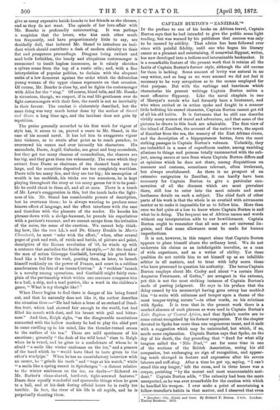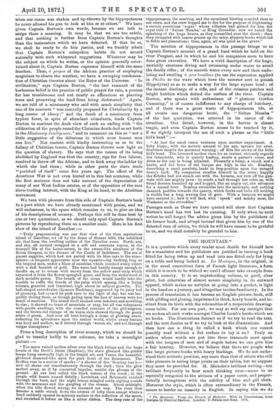CAPTAIN BURTON'S " ZANZIBAR."*
IN the preface to one of his books on African travel, Captain- Burton says that he had intended to give the public some light reading, but was warned by his publishers that success was only to be insured by solidity. That advice has been followed ever since with painful fidelity, until one who began his literary career as a pleasant and entertaining, if somewhat flippant, writer, has now developed into a tedious and interminable bookmaker. It is a remarkable feature of the present work that it retains all the faults of Captain Burton's former style, although the old excuse for them is lacking. Some amount of levity was natural in an easy writer, and so long as we were amused we did not feel it necessary to be very scrupulous as to the means employed for that purpose. But with the verbiage and heaviness which characterise his present writings Captain Burton unites a most offensive flippancy. Like the naval chaplain in one of Marryat's novels who had formerly been a lieutenant, and who when excited or in action spoke and fought in a manner little befitting his sacred character, Captain Burton cannot get rid of all his old habits. It is fortunate that he still can describe vividly many scenes of travel and adventure, and that some of the. pictures he draws in this book are admirable. The first view of the island of Zanzibar, the account of the native town, the aspect of Zanzibar from the sea, the scenery of the East African rivers,, and the description of a hippopotamus battue, form the most- striking passages in Captain Burton's volumes. Unluckily, they are imbedded in a mass of superfluous matter, among rambling allusions to things and persons totally unconnected with the sub- ject, among sneers at men from whom Captain Burton differs and at opinions which he does not share, among disquisitions on manners and customs, sometimes relevant, often irrelevant, but always overlaboured. As there is no prospect of an extensive emigration to Zanzibar, it can hardly have been, necessary for Captain Burton to give a particular enu- meration of all the diseases which are most prevalent there, still less to enter into the most minute and most loathsome details on such a subject. The chief fault of other parts of his work is that the whole is so overlaid with extraneous matter as to make it impossible for us to follow him. More than once we feel quite at a loss to know where Captain Burton is and what he is doing. The frequent use of African names and words without any interpretation adds to our bewilderment. Captain Burton ought to remember that all men are not universal lin- guists, and that some allowance must be made for human imperfections.
It is not, however, in this respect alone that Captain Burton appears to place himself above the ordinary level. We do not underrate his claims as an indefatigable traveller, as a man of wide experience, and as a writer of ability. Yet these- qualities do not entitle him to set himself up as an infallible- arbiter in all matters, and to treat with lofty scorn those- who have presumed to question his authority. The terms Captain Burton employs about Mr. Cooley and about " a certain Herr Augustus Petermann, of Gotha," are arrogant in the extreme, yet this is not the most striking instance of Captain Burton's mode of passing judgment. He says in his preface that the delay caused by his manuscript having gone astray has enabled,. him " to write with calmness and temper upon a theme of the- most temper-trying nature "—in other words, on his relations- with Speke. It is true that in the present work there is a marked absence of such phrases as were used in Captain Burton's Lake Regions of Central Africa, and that Speke's merits are to some extent recognised by his former companion. Yet the chapter devoted to Speke has more than one ungenerous taunt, and it ends with a suggestion which may be unintended, but which, if se, needs some explanation. Captain Burton says that Speke, on the day of his death, the day preceding that " fixed for what silly tongues called the Nile Duel,'" sat for some time in one of the sections of the British Association, seeing his °lit companion, but exchanging no sign of recognition, and appear- ing much changed in feature and expression after his severe labours and suffaing. After a time he got up, saying, "I can't stand this any longer," left the room, and in three hours was a corpse, perishing "by the merest and most unaccountable acci- dent." Captain Burton adds, "The calamity had been the more unexpected, as he was ever remarkable for the caution with which he handled his weapon. I ever make a point of ascertaining a fellow-traveller's habits in that matter, and I observed that even * Zanzibar: City, Island, and Coast. By Richard F. Burton. 2 vols. London: Tinsley Brothers. 1812.
We turn with pleasure from this side of Captain Burton's book to a part which we have already mentioned with praise, and we will endeavour, in the space which remains to us, to give an idea of his descriptions of scenery. Perhaps this will be done best by one or two quotations, as we should only spoil Captain Burton's pictures by reproducing them on a smaller scale. Here is his first view of the island of Zanzibar :—
"Truly prepossessing was onr first view of the then mysterious island of Zanzibar, set off by the dome of distant hills, like solidified air, that form the swelling outline of the Zanzibar coast. Earth, sea, and sky, all seemed wrapped in a soft and sensuous repose, in the tranquil life of the Lotus-eaters, in the swoon-like slumbers of the Seven Sleepers, in the dreams of the Castle of Indolence. The sea of purest sapphire, which had not parted with its blue rays to the atmo- sphere—a frequent appearance near the equator—lay basking, lazy as the tropical man, under a blaze of sunshine which touched every object with a dull burnish of gold. The wave had hardly energy enough to dandle us, or to cream with snowy foam the yellow sand-strip which separated it from the flower-spangled grass, and from the underwood of dark metallic green. The breath of the ocean would hardly take the trouble to ruffle the fronds of the palm which sprang, like a living column, graceful and luxuriant, high above its subject growths. The bell-shaped convolvulus (Ipomna Maritime), supported by its juicy bed of greenery, had opened its pink eyes to the light of day, but was lan- guidly closing them, as though gazing upon the face of heaven were too much of exertion. The island itself seemed over-indolent, and unwilling to rise ; it showed no trace of mountain or crag, but all was voluptuous with gentle swellings, with the rounded contours of the girl-negrese, and the brown-red tintage of its warm akin showed through its gauzy attire of green. And over all bent lovingly a dome of glowing azure, reflecting its splendours upon the nether world, whilst every feature was hazy and mellow, as if viewed through `woven air,' and not through vulgar atmosphere."
From a long description of river scenery, which we should be glad to transfer bodily to our columns, we take a moonlight picture
The moon rained molten silver over the black foliage and the huge fronds of the Devil's Dates (Raphias); the stars gleamed like golden lamps hung unusually high in the limpid air, and Venus, the beautiful, glittered diamond-like upon the pure front of the firmament. The fireflies rose iu a scatter of sparks—' a shower of fire' Southey has it— now all shone out simultaneously through the dark ; then the glow melted away, as if by concerted impulse, amidst the gloomy of the ground. At our feet rolled the black waters of the creek ; in the jungle wild beasts roared fitfully ; Leviathan and Behemoth crashed through the bush, and the night breeze mingled softly-sighing sounds with the murmurs and the gurgling of the stream. About midnight, when the tide flowed strong, we resumed our way. The river then became a sable streak down the avenue of lofty trees except where a bend suddenly opened its mirrory surface to the reflection of the moon, and stretched it before us like a silver ribbon. The deep roar of the hippopotamus, the snorting, and the occasional blowing sounded close to our stern, and the crew begged me to fire for the purpose of frightening a certain pernicious ' rogue ' whose villanies had gained for him the royal title of Sultan Mamba,' or King Crocodile: now we heard the splashing of the huge beasts, as they scrambled over the shoals ; then they struggled with hoarse grunts up the miry, slippery banks which led to fields and plantations; then, again, all was quiet as the grave."
The mention of hippopotamus in this passage brings us to.
Captain Burton's account of a grand hunt which he held on the river Pangani, and in which he and his companion seem to have done great execution. We have a vivid description of the huge, unwieldy creatures diving and swimming under water to avoid the deadly rifles ; of the smooth water every now and then undu- lating and swelling a gros bouillons (to use the expression applied in Phedre to the wave which bore the monster sent to punish Hippolytus) so as to make a way for the large square head ; of the instant discharge of a rifle, and of the crimson patches and bright bubbles which dotted the surface of the river. Captain Burton, who speaks with enthusiasm of " glorious Gordon Cumming," is of course indifferent to any charge of butchery, and if there was a great waste of hippopotamus life, at all events one dangerous brute, the " Sultan Mamba of the last quotation, was arrested in its career of de- struction. One detail, however, in the battue is almost tragic, and even Captain Burton seems to be touched by it, if we rightly interpret the use of such a phrase as the "little kid's head" :-
" At last the small canoe ventures upon another experiment. A baby hippo., with the naivete natural to his age, uproars his crest, doubtless despite the maternal warning : off flies the crown of the little kid's head. The bereaved mother rises for an instant, viciously regards the infanticide, who is quietly loading, snorts a parent's curse, and dives as the cap is being adjusted. Presently a bump, a shock, and a heave, and the bows of the barque are high in the air. Bombay, describing a small parabola, lands in frog-position upon the enraged brute's back. My companion steadies himself in the stern ; happily the Kiboko had not struck out with the forearm, nor torn off the gun- wale with her mighty jaws : he sends a ball through her sides as, with broad doraum hunched up and hogged, like an angry cat, she advances for a second bout. Bombay scrambles into the monoxyle, and nothing daunted, paddles towards the quarry, which funks and bolts till nothing is visible but a long, waving line of gore. With a harpoon we might have secured it ; bow it will feed, with `speck' and musky meat, the- Washenzi or the crocodiles."
Passages such as those we have quoted will show that Captain Burton's hand has not lost its cunning. If only when he next
writes he will forget the advice given him by the publishers of his former book, and adeept instead that given him by one of the detested race of critics, We think he will have reason to be grateful to us, and we shall certainly be grateful to him.



































 Previous page
Previous page